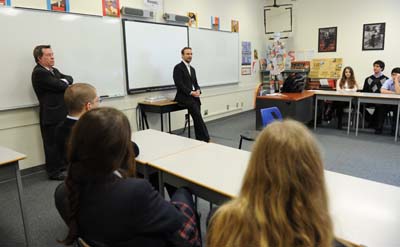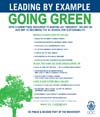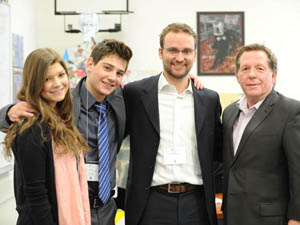 The coming of April brings about a shift in the overall mentality of students, and the city as a whole. Snow is melting, sun is shining, the Habs are battling it out in the playoffs, and it’s time to re-discover the wonders of the outside world. The increasingly pleasant weather evokes a dormant passion in us all to explore new ideas, and how better to kick it off than LCC’s 12th annual Destiny Quebec conference: an event for Montreal youth to discuss pertinent issues and current events.
The coming of April brings about a shift in the overall mentality of students, and the city as a whole. Snow is melting, sun is shining, the Habs are battling it out in the playoffs, and it’s time to re-discover the wonders of the outside world. The increasingly pleasant weather evokes a dormant passion in us all to explore new ideas, and how better to kick it off than LCC’s 12th annual Destiny Quebec conference: an event for Montreal youth to discuss pertinent issues and current events.
In recent years, our committee has oriented itself towards global and environmental themes such as “A World Without Oil” and the eminent global water crisis. This year however, we chose to go with something a little closer to home. We elected to focus on a most beautiful and cosmopolitan city: Montréal.
Over the course of the one-day conference, which took place on April 12, we sought to explore the various facets of our city’s unique character, and speculate on how it will evolve with increased immigration, globalization, and population. As the city faces challenges and changes in the years to come, our goal was to broaden the delegates’ understanding of, appreciation for, and responsibility to the city that we will one day inherit.
The day began with a small reception hosted by our headmaster, where my co-chair Kasha and I had the pleasure of meeting with several of the seminar speakers before the conference began. Our keynote speaker, Mr. Alexandre Trudeau, kicked things off with our opening assembly, where Senior School students and other delegates gathered. Mr. Trudeau’s remarks were highly engaging as he took us through the history of Montreal and emphasized how the city has always preserved a diverse, accepting, and multi-cultural identity. He concluded by asserting that Montreal will continue to develop and flourish as Canada’s most cosmopolitan city and lead the way towards a progressive and innovative future.
Following the general assembly the delegates broke off into five different seminar sessions led by 10 different thought-provoking speakers, covering a wide array of topics: business/economy, public/social institutions, infrastructure, culture and festivals.
After two hours of discussion in our smaller groups, we gathered in the WLAC (Webster Learning Activity Centre) for a break and to share ideas. It did not take long for us to realize that everyone had been inspired by their seminar discussions. Disagreement on certain political issues sparked an intense debate between Mr. Patrick Cigana, Director of “Projet Montreal,” and Professor Saeed Mirza of McGill University concerning Montreal’s infrastructure problems. The former CEOs of Alcan and Positron, two of Canada’s biggest industries over the last decades, used their acquired wisdom to lead an exceptional “Business” seminar. Messrs. Culver and Weiser had some stiff competition however, as students laughed up a storm with the Just for Laughs Chief Operating Officer, Bruce Hills, and explored Montreal’s arts & music scene with retired teacher and prolific musician, George Doxas, in the “Festivals” seminar.
Other delegates were able to travel through the world of Montreal’s sports with former Expos commentator and journalist Rodger Brulotte, and enhance their perspectives on Montreal’s situation as compared to rest of the world with Mr. Trudeau’s extensive worldly experiences and knowledge in our “Culture” discussion. The remainder of the conference attendees talked about the future of our great city’s academic and social infrastructure, as well as public works projects such as the new MUHC with the Director of Marionopolis College, Len Even, and local urban planner, Mélanie Veilleux.
Refreshed yet stimulated by the break, the delegates broke off into their second block of seminars. Discussions were even more intense than the first set of seminars as the delegates and speakers eased into the rhythm of the conference.
Closing presentations took place at 2 pm in the Chamandy Auditorium where we listened to LCC alumni John Christou ’95 and Alec Mathewson ’95 break down Montreal’s film industry with great enthusiasm. They explained the difference between independent and unionized filmmaking, and elaborated on the process of movie production as a whole. Mostly, they described the challenges and perseverance that their profession requires, and emphasized the diversity in style and concentration of creativity that our city proudly houses.
After their presentation had finished and the closing address was made, delegates said their goodbyes and poured onto Royal Avenue with somewhat different perspectives from when they arrived earlier in the day. They were more sensitive to Montreal’s opportunities, challenges and needs. At the conference end, we encouraged the delegates to make the best of their newly acquired knowledge by embracing their respective roles as citizens of Montreal.
As we look forward, and with the anticipated drop in Montreal’s English population, it is our generation’s duty to preserve Montreal’s cosmopolitan heritage and keep it on course towards a better tomorrow. This DQ conference took a small step in ensuring that today’s youth are on track to do just that (photos). — Greg Sigler ’11, Co-Chair, Destiny Quebec 2011




